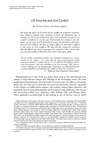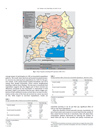-
Is Food Aid Helpful or Harmful in Conflict-Affected Areas?
October 8, 2014 By Moses Jackson Food aid is one of the most common humanitarian interventions, but it has come under increasing scrutiny from some observers who charge it may not be an effective means of addressing food security and may actually make matters worse. Two recent studies examine the relationship between food aid and conflict, shedding light on both sides of an ongoing debate.
Food aid is one of the most common humanitarian interventions, but it has come under increasing scrutiny from some observers who charge it may not be an effective means of addressing food security and may actually make matters worse. Two recent studies examine the relationship between food aid and conflict, shedding light on both sides of an ongoing debate. A study published in the American Economic Review offers macro-level quantitative support for critics’ claims that food aid, which is often prone to theft or capture by armed groups, can undermine its own objectives by sparking or fueling violence – particularly in places with a history of recent conflict, like Somalia and Afghanistan. Co-authors Nathan Nunn and Nancy Qian of Harvard and Yale, respectively, examine factors related to U.S. wheat production, which comprises the lion’s share of food aid globally, and the onset and duration of intra- and inter-state armed conflict in 125 countries over 36 years. They address a number of possible alternative explanations and confounding factors and conclude that increases in U.S. food aid tend to prolong civil conflicts already underway. They do not, however, find strong evidence linking food aid to conflicts between states or the onset of new conflicts.
A study published in the American Economic Review offers macro-level quantitative support for critics’ claims that food aid, which is often prone to theft or capture by armed groups, can undermine its own objectives by sparking or fueling violence – particularly in places with a history of recent conflict, like Somalia and Afghanistan. Co-authors Nathan Nunn and Nancy Qian of Harvard and Yale, respectively, examine factors related to U.S. wheat production, which comprises the lion’s share of food aid globally, and the onset and duration of intra- and inter-state armed conflict in 125 countries over 36 years. They address a number of possible alternative explanations and confounding factors and conclude that increases in U.S. food aid tend to prolong civil conflicts already underway. They do not, however, find strong evidence linking food aid to conflicts between states or the onset of new conflicts. On the other hand, a study published in Food Policy finds that food aid provides critical support for vulnerable populations affected by conflict. Drawing on 1,265 observations from a 2008 survey, co-authors Hamidu Tusiime, Robrecht Renard, and Lodewijk Smets investigate the impacts of food aid on household food security during a conflict in northern Uganda. Their analysis suggests food aid successfully targeted those in need and reduced household food expenditures by as much as 35 percent. The program also prevented families from having to sell valuable assets, like livestock, and decreased their propensity to skip meals and eat less. However, these benefits accrued primarily to male-headed households, and the authors recommend addressing this imbalance in future efforts.
On the other hand, a study published in Food Policy finds that food aid provides critical support for vulnerable populations affected by conflict. Drawing on 1,265 observations from a 2008 survey, co-authors Hamidu Tusiime, Robrecht Renard, and Lodewijk Smets investigate the impacts of food aid on household food security during a conflict in northern Uganda. Their analysis suggests food aid successfully targeted those in need and reduced household food expenditures by as much as 35 percent. The program also prevented families from having to sell valuable assets, like livestock, and decreased their propensity to skip meals and eat less. However, these benefits accrued primarily to male-headed households, and the authors recommend addressing this imbalance in future efforts.Sources: American Economic Review, Food Policy.
 A Publication of the Stimson Center.
A Publication of the Stimson Center.








